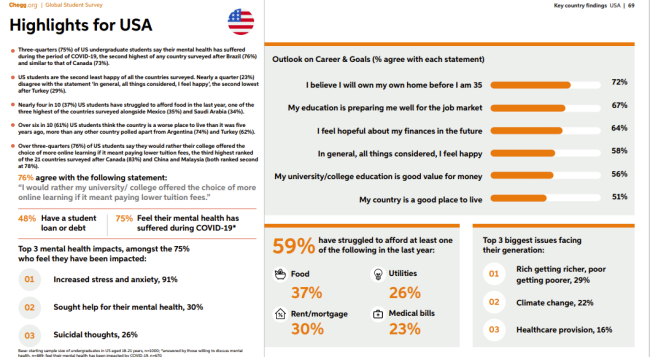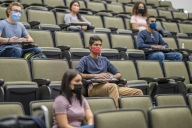You have /5 articles left.
Sign up for a free account or log in.

Chegg.org's Global Student Survey
More than half of students worldwide, and three-quarters in the U.S., said their mental health has suffered during the COVID-19 pandemic, according to a new survey of nearly 17,000 undergraduate students across 21 countries commissioned by the nonprofit arm of Chegg, a controversial textbook rental and educational technology company.
Chegg.org commissioned the polling company Yonder to interview 16,839 undergraduates across the 21 countries last fall, with sample sizes in the various countries ranging from 500 to about 1,000.
Seventy-five percent of American students surveyed said their mental health had suffered due to the pandemic, second only to Brazil (76 percent) and similar to the percentage of Canadian students who said the same (73 percent). Worldwide, across the nearly two dozen countries where students were surveyed, 56 percent of students said their mental health had suffered during the pandemic.
Among American students, 91 percent said their stress and anxiety had increased during the COVID pandemic, 30 percent said they’d sought help for mental health, 26 percent said they’d considered suicide, 12 percent said they’d self-harmed and 5 percent said they’d attempted suicide.
Just 58 percent of American undergraduates -- the second-lowest of any country after Turkey -- agreed with the statement “In general, all things considered, I feel happy.” Worldwide, 70 percent of undergraduates agreed with the statement.
"The global data also highlights the intense pressure placed upon students around the world, compounded by the pandemic," Lila Thomas, Chegg’s director of social impact and head of Chegg.org, wrote in a foreword to the report. "During the pandemic, students across the globe have shown great strength, focus and determination to keep learning and keep fighting for their future. They deserve huge praise and recognition for never giving up.
Research from the Healthy Minds Network for Research on Adolescent and Young Adult Mental Health has also found increases in reported rates of depression among students during the pandemic. Sarah Ketchen Lipson, co-principal investigator of the national Healthy Minds Study and assistant professor of health law, policy and management at Boston University, said new data from fall 2020 released last week involving about 33,000 students at 36 colleges and universities found that 47 percent of students screened positive for clinically significant symptoms of depression or anxiety. And 83 percent reported that their mental health had negatively impacted their academic performance in the last month, in what Lipson described as "a major increase from what we have seen in the past."
"From a research perspective, it's good to have more and more data and sources of information as the pandemic goes on," Lipson said of the Chegg survey. "I think all of these sources of data are showing high levels of distress, and in particular depression and anxiety among adolescents and young adults. I think continuing to get more and more sources of data is just really valuable for advancing knowledge and for advocating for the need for mental health services."
The Chegg survey also asked students about how they experienced online learning during the pandemic. About half (51 percent) of all students across the 21 countries said their instructors know how to teach effectively online, while 37 percent said they do not. In the U.S. respondents were almost evenly split on the question, with 45 percent saying yes and 44 percent saying no (11 percent said they did not know).
Fifty percent of all students across the 21 surveyed countries described their college’s online learning offerings during the pandemic as good, while just 35 percent said they’d learned as much or more as they would have with in-person learning.
Seventy-six percent of students in the U.S., compared with 65 percent worldwide, said they would prefer their institutions offer more online courses if it meant they would pay less in tuition than they normally pay.
Thirty-one percent of students worldwide, and 48 percent in the U.S., said they had a debt related to their studies. Thirty-five percent of students worldwide, and 46 percent in the U.S., said they lose sleep due to worry about their debt. Twenty-one percent of students worldwide, and 22 percent in the U.S., said it makes them so anxious they have sought medical help.
Over the previous 12 months, 30 percent of American students said they’d struggled with rent or mortgage payments, 26 percent with utility bills, 37 percent with food costs and 23 percent with medical costs.
American students identified the three biggest issues facing their generation as being the widening gap between the rich and the poor, climate change, and health care.
Sixty-seven percent of American students said they feel their education is preparing them for the job market, and 64 percent feel hopeful about their finances in the future.
Forty-eight percent of American undergraduates agreed with the statement “I believe I live in an open and free society that supports diversity, the less fortunate, and gives everyone equal opportunities.” Seventeen percent were neutral or preferred not to say, while 35 percent disagreed.








